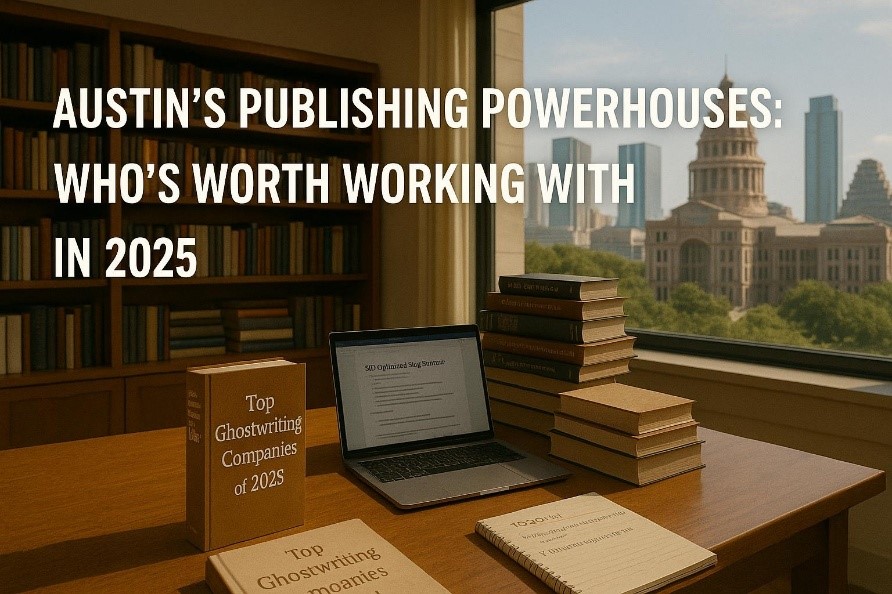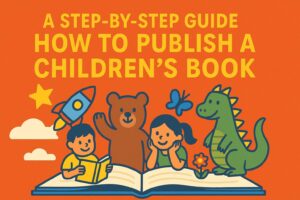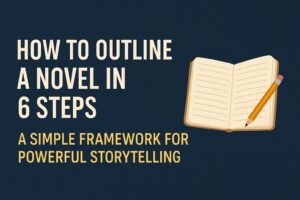Introduction
You live in Austin, which means you already know how to spot a good taco and a bad cover band. But spotting a great book publisher? That’s a whole different skill—and one you’re probably trying to figure out right now.
Maybe you’ve finished a memoir, a novel, or that business book that’s been quietly yelling at you for years. You’ve done the hard part: writing (or at least wrangling your thoughts onto the page). Now you’re staring down the next big question: Who can I trust to help me publish this?
Here’s the good news: Austin isn’t just a city for musicians and tech founders—it’s a city for storytellers. Behind the breakfast joints and vintage bookstores is a thriving, quietly powerful publishing scene. The kind where you can find a book publisher in Austin who doesn’t just take your manuscript, but sees the story behind it—and helps bring that to life with real strategy, polish, and passion.
This guide will walk you through it all: the top publishing companies in Austin, how they work, what to watch for, and how to pick the right partner for your voice and your goals.
Austin gave you the space to write. Now let’s find someone to help you publish.
Austin’s Literary Legacy: Why It’s a Hub for Writers
There’s something about Austin. Maybe it’s the blend of southern charm and indie grit. Or the way you can overhear someone quoting Bukowski in a coffee shop, then walk two blocks and hear live jazz spilling out of a dive bar. Whatever it is, this city has always drawn the creatively restless—and over time, it’s carved out a quiet legacy as one of the most writer-friendly cities in the country.
But let’s be clear: Austin didn’t just stumble into this reputation. It earned it.
Texas Book Festival
One of the largest literary festivals in the U.S., Texas Book Festival was founded by none other than Laura Bush. Every year it brings big-name authors, rising stars, and thousands of readers into the heart of downtown. It’s not just a book fair—it’s a cultural statement. It says: books matter here.
Writers’ League of Texas
Writers’ League of Texas is based right here in Austin. For decades, it’s been the beating heart of the local writing community, offering workshops, mentorship, and one-on-one support for writers at every level. Whether you’re looking to polish your novel or pitch your first nonfiction proposal, this place has your back.
Indie Bookshops
And let’s not forget the indie bookshops. BookPeople is basically sacred ground. Then you’ve got places like Malvern Books, Reverie Books, and Black Pearl Books—each offering something different, something local, something fiercely independent. They don’t just sell books. They champion them.
But what really cements Austin’s reputation as a literary hub is the ecosystem behind the scenes—the editors, designers, marketers, and yes, publishers. Over the past decade, a quiet revolution has taken place: book publishing services in Austin have grown more diverse, more accessible, and more sophisticated.
Why? Two big reasons:
First, the University of Texas at Austin. It’s more than just a top-tier university. It’s a pipeline of talent—writers, editors, researchers, and creative minds who feed into the city’s publishing landscape. UT Press alone has shaped the academic and nonfiction publishing scene in Texas and beyond.
Second, the city’s entrepreneurial spirit. You won’t just find traditional publishers here—you’ll find hybrid models, creative studios, ghostwriting agencies, and boutique firms that specialize in getting books out into the world without making you hand over your soul or your royalties. Whether you’re after a prestige academic imprint or want full control with professional polish, there’s a fit for you.
It’s this mix—creative energy, institutional power, and independent spirit—that makes Austin different from bigger, flashier publishing cities. You won’t find the same industry gatekeeping you’d hit in New York or LA. Instead, you’ll find doors that are slightly more open. A little more human. A little more Texan.
So if you’re a writer looking for connection, support, and smart, soulful, leading book publishers in Austin, you’re in the right place. The only question is: what kind of story are you trying to tell—and who’s going to help you tell it?
What Makes a Publisher “Top” in Austin?
Let’s get one thing straight: not every publisher with an Austin zip code deserves your manuscript.
So how do you separate the contenders from the pretenders?
Here’s what the top publishers in Austin actually do right.
Editorial Excellence
Top publishers treat editing like an art form, not an afterthought. They don’t just correct grammar—they help you shape your story. Whether it’s developmental editing (for structure) or line editing (for clarity and tone), a good publisher will invest in your words. If they’re not willing to give tough love to your manuscript, they’re not worth working with.
Transparent Contracts
Vague terms are a red flag. A top-tier publisher will spell things out in plain English—what rights you’re giving up (if any), how royalties are paid, and what you can expect from distribution and marketing. If the contract feels like a legal maze, run.
Smart, Multi-Format Distribution
Your book shouldn’t just live on Amazon. Leading publishers get your work into bookstores, libraries, audio platforms, and sometimes even foreign markets. They understand metadata, launch strategies, and how to build visibility beyond launch day.
Strategic Services
It’s not just about getting the book out—it’s about how. The best publishers offer (or partner with) pros in ghostwriting, design, PR, and author branding. Many of the best book writers in Austin work alongside these companies, creating collaborative experiences that feel more like a creative studio than a factory.
Real Results
Look at their backlist. Have their books won awards? Landed media coverage? Actually sold? A top publisher has success stories you can verify—and authors who come back for second, third, and fourth books.
Respect for Your Voice
This one’s subtle, but critical. A great publisher doesn’t try to rewrite you into someone you’re not. They amplify your voice, sharpen your ideas, and work with you—not over you.
In short: the top book publishers in Austin don’t just put books out into the world. They put the right books into the hands of the right readers—with respect, creativity, and a real plan.
How to Choose the Right Publisher in Austin
Choosing a publisher isn’t just a business decision—it’s creative matchmaking. And in Austin, where options range from boutique studios to academic giants, it’s easy to feel like everyone’s talking, but no one’s really listening.
The right partner won’t just print your book—they’ll get it, sharpen it, and help it land where it matters. But you’ll need to ask the right questions, spot red flags early, and know what you actually want out of the process.
Here’s how to do exactly that.
Define Your Goal (Before You Even Start Looking)
Are you after creative control or industry prestige? Want to move fast or take your time crafting a legacy piece? Some writers want to see their book in independent shops around Austin. Others want national exposure—or a product that doubles as a business card. There’s no wrong answer, but you need to know your answer before reaching out to publishers.
For instance:
- If you want editorial support and complete ownership of your work, a hybrid publisher or boutique firm might be the way to go.
- If you dream of literary prizes or academic recognition, a traditional press like UT Press may be a better fit (if you’re patient).
- If you’ve got the ideas but not the time to write, look into book writing services in Austin—some publishers work with in-house ghostwriters to help you shape your story from scratch.
Research Their Process—and Ask Questions
Dig into their website, testimonials, and past titles. Look for consistency, transparency, and diversity in what they publish. Then, ask real questions:
- How involved will I be in the editing process?
- Do I keep my rights?
- What kind of marketing support do you provide?
- Can I talk to one of your past authors?
Good publishers will answer these without flinching. Great ones will offer those answers before you even ask.
Look for Proof, Not Just Promises
Are their books actually on shelves? Are they getting reviewed? A strong track record doesn’t always mean big sales numbers (though that helps)—it means results that matter to the author. Visibility. Distribution. Positive reception. If everything feels vague or buried behind paywalls, that’s a warning sign.
Read the Fine Print Like Your Book Depends on It (Because It Does)
Whether it’s a full-on publishing contract or a simple service agreement, read everything. Twice. Pay attention to:
- Royalty splits
- Ownership of content
- Editorial rights
- Timeline and deliverables
And if anything feels off, don’t be afraid to walk away. A good publisher will never pressure you to sign fast.
Trust the Vibe
This isn’t just business—it’s creative collaboration. If a publisher makes you feel talked down to, rushed, or confused, that’s not someone you want in your corner during revisions, launches, or inevitable late-night panic attacks.
The right publisher doesn’t just “take your book.” They believe in it—and in you.
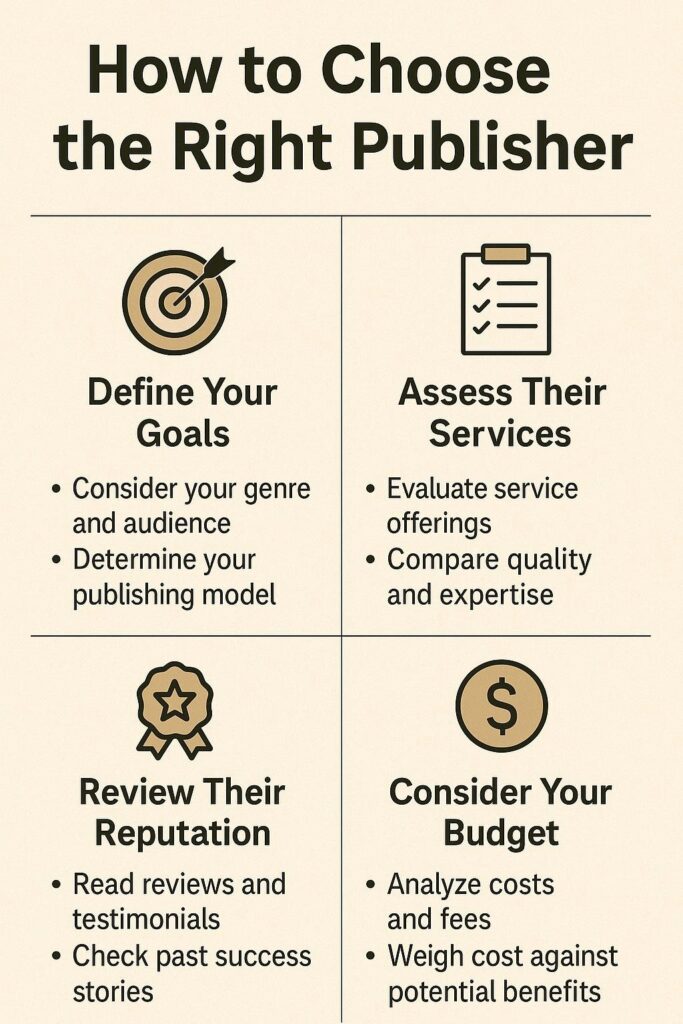
The Publishing Process with a Professional Company
Most authors fixate on the outcome: a printed book in their hands, a name on the spine, maybe a line of glowing reviews. But the quality of that outcome depends entirely on the process behind it—and that process is often misunderstood.
Professional publishing isn’t just about pushing your manuscript through a system. It’s a series of deliberate, editorial, and strategic steps—each one designed to protect the integrity of your work while preparing it for a competitive market.
And if you’re looking at book publishing services in Austin, this is what you should expect at a minimum: structure, clarity, collaboration, and respect for your voice. No shortcuts. No vague promises. Just real expertise at every stage.
Here’s what that process looks like from start to finish.
Step 1: Pitch or Consultation
The process typically starts with a submission or a consultation, depending on the type of publisher. Traditional presses may ask for a proposal or sample chapters. Hybrid and boutique firms often begin with a conversation—about your goals, timeline, genre, and the role you want to play in the publishing journey.
This stage is crucial not because it’s formal, but because it’s clarifying. You’ll know quickly whether the publisher understands your book and your audience.
Step 2: Editorial Review
Next comes the manuscript evaluation. If you’re partnering with a company that offers premium book editing services in Austin, this is where you’ll see real value. Developmental editors assess your book’s structure, tone, and logic. Line editors focus on sentence-level clarity and style. Copyeditors handle grammar, syntax, and consistency.
A quality team won’t just “clean up” your work—they’ll strengthen it without compromising your voice.
Step 3: Contracts & Rights
Once both sides are aligned, you’ll sign a contract outlining rights, royalties, and responsibilities. This step should be transparent and easy to understand. A reputable publisher won’t bury important clauses or rush you through the fine print. Ownership terms, royalty percentages, timelines, and deliverables should be clearly defined.
Step 4: Production & Design
With editing complete, your manuscript moves into production. This includes interior formatting, layout, typesetting, and cover design. A professional design team ensures your book looks like it belongs on a real shelf—not a digital slush pile.
You should have creative input here. If the publisher doesn’t offer revisions or consultation on visual elements, that’s a red flag.
Step 5: Publishing
Now comes the release. ISBNs are assigned. Files are finalized. The book is uploaded to major platforms—Amazon, IngramSpark, Apple Books, Barnes & Noble—and print-ready files are prepared for physical distribution. Depending on your agreement, this may include hardcover, paperback, eBook, and audiobook formats.
Step 6: Marketing & Distribution
Publishing without marketing is wishful thinking. The best publishers offer marketing strategy and support—launch plans, email campaigns, influencer outreach, and retail placement. They understand visibility and help you build credibility.
If “marketing” only means tweeting your launch date, you’re not working with professionals.
Professional publishing is a craft. And with the right team, especially in a city known for creative quality, the process can be as rewarding as the final product.
Top 5 Publishing Companies in Austin
Austin isn’t short on publishers. But what you want is a team that knows how to handle your book with care, insight, and strategy. The following five companies each take a different approach to publishing, but all have earned their place through consistent results, author praise, and a serious commitment to craft.
Whether you’re looking for white-glove service or a focused academic route, here are five names worth knowing:
Writers Of The West
If you’re looking for the kind of publishing experience that feels more like working with a creative studio than a publishing factory, Writers Of The West should be at the top of your list. This full-service firm offers everything from ghostwriting to book design to long-tail marketing strategy. Their edge lies in personalization—they don’t cookie-cutter anything. Their distribution reach is impressive, and they offer authors full ownership of rights—rare in traditional setups.
They work with fiction, nonfiction, memoir, and business titles, and are known for pairing authors with dedicated project leads, handpicked ghostwriters, and some of the most premium book editors in Austin.
Pros:
- End-to-end publishing support, including ghostwriting, editing, design, and distribution
- Excellent for professionals or debut authors looking to create something refined and market-ready
- Proven track record across genres, with return authors and media attention
High-touch client service that feels bespoke rather than transactional
Cons:
- Not a fit for ultra-short projects under 15,000 words (they prioritize substance)
- Initial consultations may take 2–3 weeks to schedule (because, yes, they’re in demand)
Greenleaf Book Group
One of the most recognized hybrid publishers in the country, Greenleaf is based in Austin and known for its business and thought-leadership titles.
Pros:
- Strong industry distribution and sales strategy
- Authors retain creative and legal rights
- Experienced team with robust publishing infrastructure
Cons:
- Upfront financial investment required
- Focuses more on nonfiction, especially business and leadership genres
University of Texas Press
If you’re publishing academic work or serious nonfiction, UT Press offers prestige, rigor, and scholarly reach. Backed by the University of Texas at Austin, it has a long-standing reputation for publishing intelligent, culturally relevant books.
Pros:
- Academic credibility and university-affiliated distribution
- Ideal for nonfiction, research-based titles, or culturally significant works
Cons:
- Highly competitive submission process
- Not suitable for fiction or commercial self-starters
Bento Books
An indie press with a passion for translated works—especially from Japanese—and crossover titles in the YA and fantasy space. Small but mighty, Bento is perfect if you have a culturally unique or multilingual story.
Pros:
- Clear mission and unique niche
- Ideal for international voices or translated works
- Hands-on team that curates every project with care
Cons:
- Limited annual output due to team size
- Less infrastructure for wide-scale commercial marketing
Atmosphere Press
Atmosphere calls itself an “author-friendly publisher,” and they mean it. This selective hybrid press gives writers the tools to publish professionally while maintaining full control. They’re particularly popular among first-time authors.
Pros:
- Great for debut writers seeking guidance
- Offers editing, design, and distribution support
- Transparent, collaborative process
Cons:
- Author-funded model
- Timelines can stretch if you require extensive editorial development
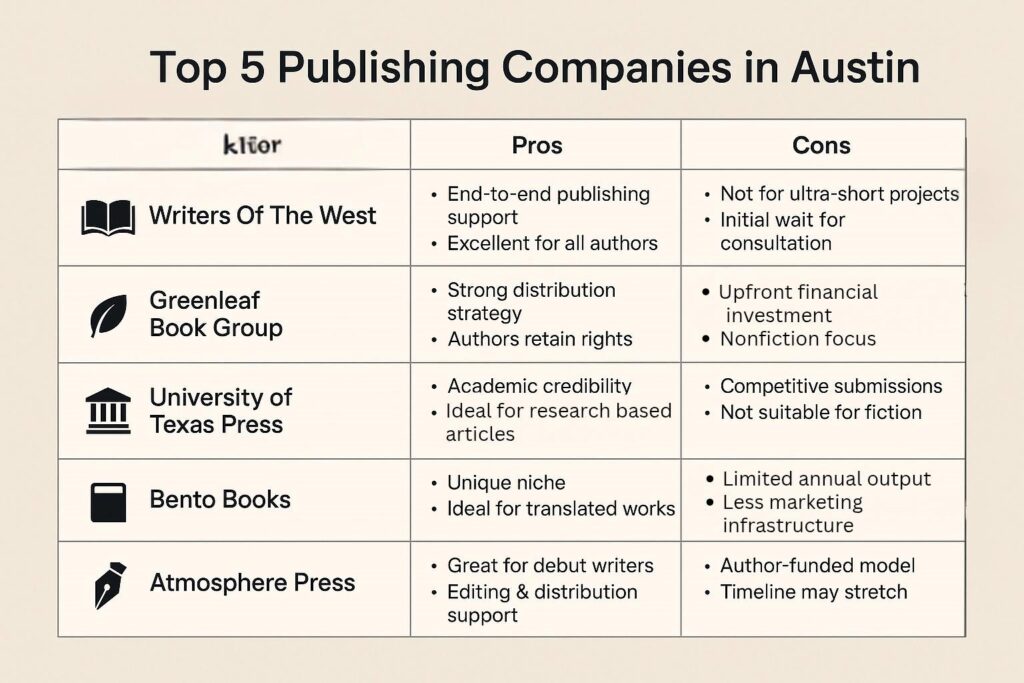
Whether you’re seeking hands-on book writing services in Austin or a partner to refine and elevate an existing manuscript, these five publishers each bring something different to the table. The key is matching their strengths to your goals—and knowing that the best publishing experiences aren’t just about printing a book. They’re about building a relationship that respects your voice, your story, and your readers.
FAQs
Q: Are Austin publishers beginner-friendly?
Yes—especially hybrid publishers and full-service firms. Writers Of The West, Atmosphere Press, and Bento Books are all known for working with first-time authors. They don’t expect a polished manuscript or publishing experience. They expect a good story and a willingness to collaborate.
Q: How long does the publishing process take?
It depends on your path. If you’re using a full-service firm and starting from scratch (writing + editing + production), you’re looking at 9–18 months. If your manuscript is complete and only needs editing and formatting, it can take 4–6 months. Traditional publishing can stretch to 18–24 months due to submission timelines and print schedules.
Q: Will I keep the rights to my book?
That depends on the model.
Traditional publishers typically require you to license or transfer certain rights in exchange for distribution, editing, and credibility.
Hybrid and agency-based models—like Writers Of The West and Greenleaf—usually let you retain full ownership. That means you control reprints, foreign rights, adaptations, and royalties.
Always read the contract. If you don’t understand the rights section, ask or hire a publishing lawyer to review it.
Q: Can I publish a book without writing it myself?
Yes. This is where ghostwriting or collaborative writing comes in. It’s common among professionals, entrepreneurs, and even novelists who need help shaping or completing their ideas.
Firms that offer book writing services in Austin can match you with a writer who works in your voice and tone. You stay in control of the story, but they do the heavy lifting on the page.
Q: How do I know if a publisher is legitimate?
Check their catalogue. Ask how many books they’ve published. Look for client testimonials. Real publishers are transparent about what they’ve done and who they’ve worked with. If their answer to “Can I talk to one of your past authors?” is cagey or vague—run.
Q: What if I only need editing, not publishing?
You don’t have to do it all under one roof. Many authors choose to work with the leading book publishers in Austin for editing as a standalone step before self-publishing or querying agents. You’ll get the benefit of pro-level editing without locking into a full publishing deal.
Conclusion
You don’t have to leave Austin—or lower your standards—to publish a great book.
Whether you’re starting with a rough draft or a polished manuscript, the resources you need are already here: sharp editors, skilled ghostwriters, savvy marketers, and professional teams who know how to take a story from idea to bookshelf.
From boutique firms like Writers Of The West to hybrid models like Greenleaf, to academic pillars like UT Press, there’s no shortage of talent among book publishers in Austin. But talent is just part of the equation. You want a team that listens, challenges, and respects your voice.
If you’ve been waiting for permission, this is it. Your story deserves better than a rushed upload or a half-hearted edit. Austin is filled with professionals who can help you do it right—on your terms.
Now the question isn’t if you can publish your book. It’s who you want by your side when you do.

